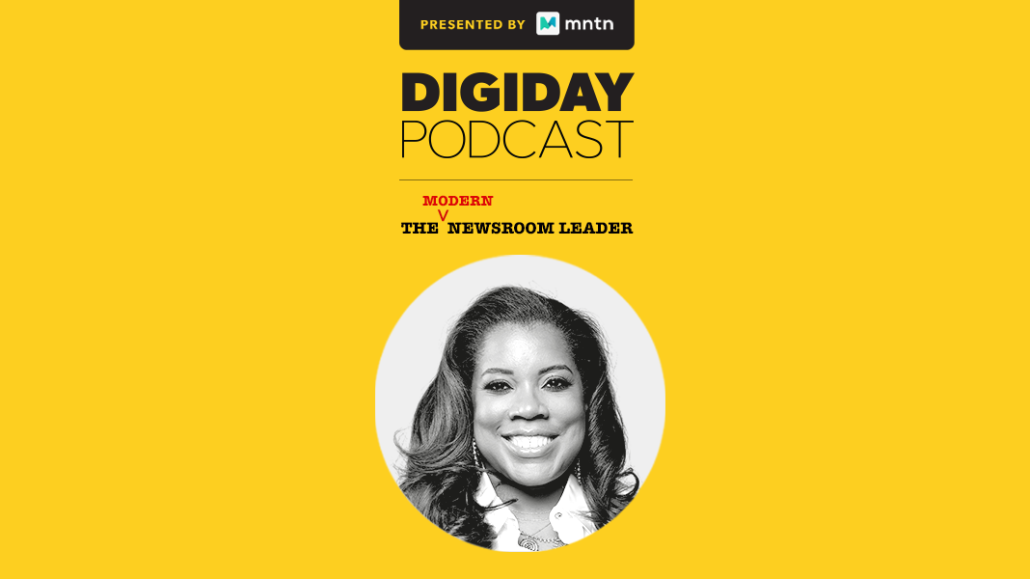Secure your place at the Digiday Media Buying Summit in Nashville, March 2-4
HuffPost’s Danielle Belton sees the editor-in-chief role as being ‘newsroom therapist’

Subscribe: Apple Podcasts | Stitcher | Google Play | Spotify
When Danielle Belton started as HuffPost’s editor-in-chief in April, she stepped into a newsroom that had spent a year in tumult. In addition to the trials of covering and living through the pandemic, the news outlet’s staff had gone through a sale from Verizon Media to BuzzFeed that eventually led to 70 HuffPost employees being laid off. And all the while, the newsroom had been without an official editor-in-chief (HuffPost’s former executive editor Hillary Frey had served as the de facto leader during that time).
“They went so long without an editor-in-chief. The fact that there was going to be one put into place and that they were going to have their own leader independent of BuzzFeed and BuzzFeed News meant a lot. I felt like the reaction I got was actually more warm than anything else. And one of relief,” Belton said in the latest episode of the Digiday Podcast, which was recorded live during the Digiday Publishing Summit on Sept. 27 in Miami.
Of course, Belton’s appointment alone wouldn’t instantaneously alleviate all stress and anxiety among HuffPost’s staff. That’s why the former editor-in-chief of G/O Media’s The Root sees her role as being the outlet’s “newsroom therapist.” It’s a role she has found herself playing since she started working in journalism and spent time roaming newsrooms where she has worked to check in with other staffers.
“I used to tell my bosses, ‘You guys should just pay me to be the newsroom therapist. I can just talk to everybody all day and listen to their problems and help them figure out how to solve them and help them with their stories.’ And that’s basically what I’m doing now. I’m the newsroom therapist,” Belton said.
This episode is the final in a four-part series for the Digiday Podcast called “The Modern Newsroom Leader,” featuring editors-in-chief as they navigate new industry challenges including staffers dealing with burnout, unsteady financial businesses and prioritizing diversity, equity and inclusion in hiring practices. Previous episodes featured The Cut’s Lindsay Peoples Wagner and Vox’s Swati Sharma, Houston Chronicle’s Maria Reeve and Gawker’s Leah Finnegan.
Here are a few highlights from the conversation, which have been edited for length and clarity.
A 90-day plan and forever tour
I enacted a 90-day plan. The first 30 days of the 90 days was a listening tour, which I extended for pretty much the duration of the 90-day plan into infinity. It’s a forever tour.
Getting to know the newsroom
The last thing I wanted to do was to come in and start changing things, start just ordering people around without having any idea of how things historically have been done at the organization. And so I was like, ‘What’s the fastest way I can get up to speed? I can literally talk to everyone.’ So I spoke to teams. I spoke to individuals. I spoke to staff writers. I spoke to people on the audience team, people in sales, everyone.
Team get-togethers
This last-month, I’ve started doing team dinners. For my team members who are in New York, I’ll take seven to 10 of them out to dinner, get to know all of them, actually get in some face time.
Shouting out employees
At HuffPost, I do a monthly email — it’s like a roundup — just at the end of the month where I talk about what I liked, what great work that individuals are doing and really try to praise people. I also try to take time out during the month to reach out to people individually to let them know if I really liked something that they did.
This article has been updated to clarify that HuffPost had been without an editor-in-chief for more than a year before Belton joined and that Hillary Frey had served as the newsroom’s leader during that time. A previous version stated that HuffPost’s newsroom had been without a leader in that period.
More in Media

From feeds to streets: How mega influencer Haley Baylee is diversifying beyond platform algorithms
Kalil is partnering with LinkNYC to take her social media content into the real world and the streets of NYC.

‘A brand trip’: How the creator economy showed up at this year’s Super Bowl
Super Bowl 2026 had more on-the-ground brand activations and creator participation than ever, showcasing how it’s become a massive IRL moment for the creator economy.

Media Briefing: Turning scraped content into paid assets — Amazon and Microsoft build AI marketplaces
Amazon plans an AI content marketplace to join Microsoft’s efforts and pay publishers — but it relies on AI com stop scraping for free.







